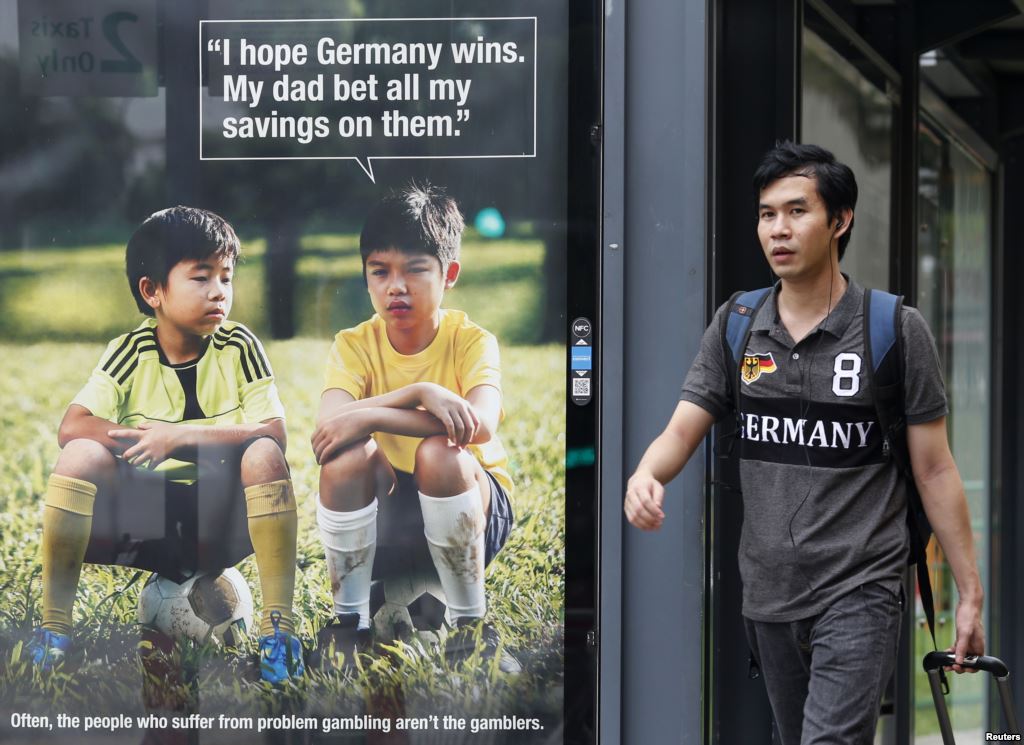Anti Gambling Campaign Singapore
Legislation passed in 2014 provided a much needed update and clarification of the gambling laws of Singapore. Unfortunately, the Remote Gambling Act of 2014 banned online betting in Singapore to the point where it is a crime to even play online at overseas betting sites.
- Anti Gambling Campaign Singapore Government
- Anti Gambling Campaign Singapore Promotion
- Anti Gambling Campaign Singapore Website
- Anti Gambling Campaign Singapore Contact
- Anti Gambling Campaign Singapore Immigration
- Anti Gambling Campaign Singapore
- Anti Gambling Campaign Singapore Coronavirus
Singapore: Gambling Laws and Regulations 2021. ICLG - Gambling Laws and Regulations - covers common issues in gambling laws and regulations – including relevant authorities and legislation, application for a licence, licence restrictions, digital media, enforcement and liability – in 37 jurisdictions. A Singapore anti-gambling advert backfired after the football World Cup team it referred to - Germany - turned out to be the champions. The ad featured a boy called Andy complaining to friends that. Huge collection of Funny Viral Videos, Images and Memes. Anti-gambling campaign in Singapore didn’t go as planned Join and share your funny stuff with the worls and give it a chance to make it viral. Enjoy, share and interact with other hillarious memes.
The most recent gaming laws in the country represent a drastic attempt to crackdown on offshore gaming. It is now an offense for residents to bet on sports, play casino games or participate in online poker at any Singaporean betting site. The 2014 Act also includes provisions that allow the government to block access to gaming websites and deposits to gaming operators.
Now, the closest thing Singapore has to legal online gambling is a single government owned website called Singapore Pools. The website does not offer actual online gambling, but it does allow customers to sign up for accounts, place bets by phone, track transactions online and receive payments to the online account.

Best Singapore Betting Sites
Please note that there ARE criminal laws in place that ban individual gamblers from signing up and playing at Singaporean betting sites. Despite the prohibition, there are dozens of gaming sites to choose from for online sports betting, poker and casino games. I do not recommend playing online at this time, but I will provide an overview of what it’s like strictly for information purposes.
If you feel the legal risk is worth it, I strongly urge you to stick with the biggest names in online betting. There’s no need to play at small, unknown sites with questionable backgrounds when there are dozens of established operators who have proven over the long term that they know how to put on a safe and fair game. These sites tend to be based out of European countries where online gambling is legal, licensed and regulated.
In addition to questionable legality, the other downside to playing online from Singapore is dealing with currency exchanges. Since there are no legal Singapore online casinos, every site based out of elsewhere deals in different currencies. You can still deposit in Singapore dollars but you can’t actually play the games using SGD. All deposits are converted into the USD, EUR or GBP at some point.
If you play at a site that does accept SGD deposits, you can fund your account with credit cards, direct bank transfers and e-wallets such as Neteller, Skrill and Click2Pay. If you play at a site that does not accept SGD, you can use an e-wallet to convert your money before depositing. Currency exchange fees are annoying, but it’s better than paying 100 SGD just to walk in the door of any land-based casino in Singapore.
Gambling Law in Singapore
The gambling laws of Singapore are badly outdated and apply to brick-and-mortar gambling only. The only pieces of legislation to come out in recent years include a 2006 law that allowed for the construction of two major casinos and another regulating lotteries.
Anti Gambling Campaign Singapore Government
Five pieces of legislation regulate all gambling in Singapore. These are:
- Remote Gambling Act 2014 (summary)
- The Betting Act of 1960 (full text)
- Common Gaming Houses Act of 1961 (full text)
- Private Lotteries Act of 2011 (full text)
- Betting and Sweepstakes Duties Act of 1948 (full text)
- Casino Control Act of 2006 (full text)
These bills comprise the totality of gambling legislation in Singapore. Only one of these address online gaming specifically and none provide a licensing mechanism by which gambling sites could ever open on Singapore territory. That leaves us with the current situation in which it is illegal to operate a gaming site inside Singapore or visit one as a customer.
The Casino Control Act of 2006 represents a major missed opportunity by Singapore officials. The Act set up a licensing mechanism for brick-and-mortar casinos but made no mention of the internet even though online gaming was widespread by 2006.

The Casino Regulatory Authority of Singapore (CRA) was created by the same act. Its primary function is to monitor Singapore casinos to ensure they remain fair, free from criminal influence and do not exploit the vulnerable. Its secondary function is to issue licenses to land-based casinos. So far, it has issued two licenses: one to Marina Bay Sands near Marina Bay and one to Resorts World at Sentosa on Sentosa island.
As a part of the licensing agreement, these casinos are required to tailor their products to tourists and not encourage locals to play. Both casinos are required to allow foreigners in for free but charge $100 per day to Singapore residents. In 2012, each casino was fined $385,000 for letting citizens in for free, allowing citizens to stay too long and not properly preventing minors from entering.
Singapore also has a state-operated website that allows citizens to bet on certain sports. Singapore Pools provides both online and in-person betting on football and auto racing. It is fairly limited in what it offers but remains popular nonetheless. Singaporeans interested in betting on other sports should look to offshore betting sites.
One other option for wagering is the Singapore Turf Club. This organization was formed in 1842 and acts as the only legal form of horse racing and betting in the country. Citizens can place horse wagers with the Turf Club in person, over the phone and via mobile smartphone apps.
In 2013, Singapore announced that it was preparing legislation to crack down on internet gambling. The CRA noted previously that online gambling was more addictive than land-based betting and found it to be a danger for citizens. The proposed legislation would include web censorship of gambling sites, new regulations requiring the banking industry to block transactions to offshore betting websites and additional restrictions on advertising.
The proposed legislation was passed in 2014 and Singapore’s government continues to discourage citizens from gambling to this day. The anti-gambling campaign was embarrassed in 2014 after running a barrage of ads which depicted a sad-looking boy saying he hoped Germany would win because his dad had bet his life savings on the Germans. When Germany thrashed Brazil 7-1 and went on to win the tournament, Singaporeans had a field day mocking the ads.
At the time of this writing, internet gaming is still a bit of a murky subject in Singapore. Gaming laws clearly state that it is an offense, but there seem to be few legal mechanisms in place to enforce the law. Even so, the risk is real and I would recommend Singaporeans be very careful if you decide to play online today.
Anti Gambling Campaign Singapore Promotion
Anti Gambling Campaign Singapore Website
Copy Citation
Anti Gambling Campaign Singapore Contact
Export Citation
Anti Gambling Campaign Singapore Immigration
With a personal account, you can read up to 100 articles each month for free.
Already have an account? Login
Monthly Plan
- Access everything in the JPASS collection
- Read the full-text of every article
- Download up to 10 article PDFs to save and keep
Yearly Plan
- Access everything in the JPASS collection
- Read the full-text of every article
- Download up to 120 article PDFs to save and keep
As Singapore is the least corrupt country in Asia, this article contends that China can improve its anti-corruption efforts by drawing lessons from Singapore's effective anti-corruption strategy in spite of the contextual differences between both countries. Singapore's success in curbing corruption can be attributed to the political will of the People's Action Party government which is reflected in the allocation of sufficient budget and personnel to the Corrupt Practices Investigation Bureau to ensure that it enforces the anti-corruption laws impartially, regardless of the offender's position, status or political affiliation. By contrast, China's multiple anti-corruption agencies (ACAs) and anti-corruption campaigns are ineffective because they do not address the causes of corruption. President Xi Jinping's current anti-corruption campaign suffers from these three limitations: (1) it deals with the symptoms of corruption without addressing the causes; (2) the anti-corruption laws are enforced selectively and not impartially; and (3) the political leaders use the campaign as a weapon against their political opponents. China can enhance its anticorruption strategy by learning these four lessons from Singapore's success: (1) the critical importance of political will; (2) reliance on a single ACA with adequate personnel and budget instead of multiple ACAs; (3) enforce the anti-corruption laws impartially and avoid using corruption as a weapon against political opponents; and (4) address the causes of corruption instead of relying on ineffective anticorruption campaigns. However, the implementation of these four lessons requires China's political leaders to pay the high price of introducing checks on their power, which is unlikely to occur.

The American Journal of Chinese Studies is an internationally circulated journal in its 20th year of publication. The AJCS is the official publication of the American Association for Chinese Studies and is published twice a year, in April and October. The language of publication is English. The AJCS is interested in receiving manuscripts dealing with Taiwan or China. The AJCS publishes articles in all social science disciplines, including history. The AJCS also has a special interest in publishing humanities articles. Manuscripts are refereed for acceptance. All opinions expressed in the AJCS are the author's and should not be imputed to the association.
Anti Gambling Campaign Singapore
Anti Gambling Campaign Singapore Coronavirus
The American Association for Chinese Studies (AACS) annual conference program committee invites proposals for panels, roundtables, and papers concerning China, Taiwan, and the Chinese diaspora for the 59th Annual Conference, hosted by the Walker Institute, University of South Carolina in Columbia, South Carolina, from October 20-22, 2017. The theme of the conference is 'China and Taiwan in a Changing World'. The AACS seeks to construct a balanced program, including panels representing the humanities, social sciences, communication studies, education, business, and other related disciplines.
This item is part of JSTOR collection
For terms and use, please refer to our Terms and Conditions
American Journal of Chinese Studies © 2016 American Association of Chinese Studies
Request Permissions